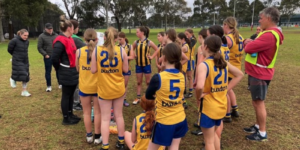Handling Peer Pressure and Toxic Relationships in Primary and High school
By:
Dr. Natalie Flatt (nee McCabe), East Sandringham JFC Chief Mental Health Officer and Mum of 2 Zebbies 🦓 🦓
While friendships can bring joy, support, and a sense of belonging, they can also sometimes turn toxic, leading to negative consequences for your child’s well-being. In this blog, we’ll explore the dynamics of peer pressure and toxic friendships and provide practical advice on how to support your child through these experiences.
Understanding Toxic Friendships
Child and teenage friendships can sometimes take a negative turn when individuals engage in toxic behaviours such as manipulation, exclusion, or verbal abuse. These toxic dynamics, often disguised as friendship, can leave your child feeling insecure, anxious, or even unworthy.
Identifying toxic friendships is crucial for supporting your child’s mental health and well-being. Signs of toxic friendships may include consistent negativity, manipulation, or exclusion from social activities. By being aware of these signs, you can help your child recognize when a friendship is becoming unhealthy.
Managing Peer Pressure
Peer pressure is another common challenge in child friendships, where individuals may feel compelled to conform to certain behaviours or attitudes to fit in with their peers. Whether it’s succumbing to social media trends or engaging in risky behaviours, peer pressure can exert a significant influence on your child’s choices and self-esteem.
Empowering your child to resist peer pressure involves building open communication and fostering their confidence in making independent decisions. Here are some “how” examples:
- Set Boundaries: Encourage your child to assert their boundaries by role-playing scenarios and practicing assertive communication. For example, teach them phrases like, “I’m not comfortable with that,” or “I need some space right now.”
- Seek Support: Help your child identify trusted adults they can turn to for support, such as a parent, teacher, or school counsellor. Role-play conversations with these adults to help your child feel more confident in reaching out for help.
- Explore New Friendships: Encourage your child to join clubs or activities where they can meet new peers who share their interests. Offer to accompany them to these activities initially to provide moral support and encouragement.
- Focus on Self-Care: Teach your child self-care practices such as deep breathing exercises, journaling, or engaging in hobbies they enjoy. Model self-care behaviours yourself to demonstrate its importance.
- Know When to Walk Away: Discuss with your child scenarios in which it may be necessary to end a toxic friendship, and brainstorm together how they can initiate that conversation. Reassure them that it’s okay to prioritise their own well-being.
The Impact on School and Sports Performance:
Toxic friendships and peer group pressure can significantly affect both school and sports performance through bad influence. Negative peer influence may lead your child to engage in behaviours such as skipping classes, procrastinating on assignments, or participating in disruptive activities in school. Additionally, toxic friendships can create emotional stress and distraction, making it difficult for your child to focus on their academic responsibilities.
In the land of sports, peer pressure from toxic friendships may manifest in unhealthy competition, aggressive behaviour, or performance-enhancing substance use. Your child may feel pressured to prioritise social acceptance over sportsmanship, leading to a decline in their performance and enjoyment of sports activities.
Supporting Your Child Through Peer Challenges:
As a parent, it’s essential to provide ongoing support and guidance to help your child navigate the challenges of toxic friendships and peer pressure. Encourage open communication, validate your child’s feelings, and offer practical strategies for managing peer-related stressors. By creating a supportive and nurturing environment at home, you can empower your child to make healthy choices and create positive relationships that contribute to their overall well-being and success.
Navigating the best type of friendships for your child requires awareness, communication, and support from parents and caregivers. By equipping your child with the tools and resources to navigate peer challenges, you can help them build resilience, self-confidence, and healthy relationship skills that will serve them well throughout their lives.

